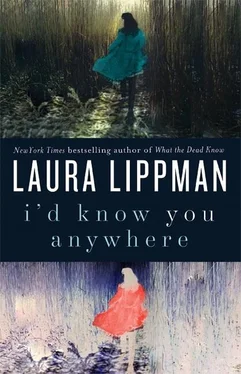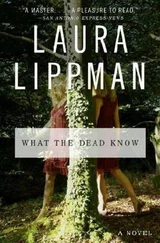Laura Lippman
I’D KNOW YOU ANYWHERE
Part I
I’D KNOW YOU ANYWHERE
“ISO TIME FOR—”
Eliza Benedict paused at the foot of the stairs. Time for what, exactly? All summer long—it was now August—Eliza had been having trouble finding the right words. Not complicated ones, the things required to express strong emotions or abstract concepts, make difficult confessions to loved ones. She groped for the simplest words imaginable, everyday nouns. She was only thirty-eight. What would her mind be like at fifty, at seventy? Yet her own mother was sharp as a tack at the age of seventy-seven.
No, this was clearly a temporary, transitional problem, a consequence of the family’s return to the States after six years in England. Ironic, because Eliza had scrupulously avoided Briticisms while living there; she thought Americans who availed themselves of local slang were pretentious. Yet home again, she couldn’t get such words— lift, lorry, quid, loo —out of her head, her mouth. The result was that she was often tongue-tied, as she was now. Not at a loss for words, as the saying would have it, but overwhelmed with words, weighed down with words, drowning in them.
She started over, projecting her voice up the stairs without actually yelling, a technique in which she took great pride. “Iso, time for football camp.”
“Soccer,” her daughter replied in a muffled, yet clearly scornful voice, her default tone since turning thirteen seven months ago. There was a series of slamming and banging noises, drawers and doors, and when she spoke again, Iso’s voice was clearer. (Where had her head been just moments ago, in the laundry hamper, inside her jersey, in the toilet ? Eliza had a lot of fears, so far unfounded, about eating disorders.) “Why is it that you called it soccer when everyone else said football, and now you say football when you know it’s supposed to be soccer?”
At least I remembered to call you Iso .
“It’s your camp and you’re the one who hates to be late.”
“Football is better,” said Albie, hovering at Eliza’s elbow. Just turned eight, he was still young enough to enjoy being by—and on—Eliza’s side.
“Better as a word, or better as a sport?”
“As a word, for soccer,” he said. “It’s closer to being right. Because it’s mainly feet, and sometimes heads. And hands, for the goalie. While American football is more hands than feet—they don’t kick it so much. They throw and carry it.”
“Which do you like better, as a sport?”
“Soccer for playing, American football for watching.” Albie, to Eliza’s knowledge, had never seen a single minute of American football. But he believed that affection should be apportioned evenly. At dinner, Albie tried to eat so that he finished all his food at about the same time, lest his peas suspect that he preferred his chicken.
Isobel— Iso —clattered down the stairs, defiant in her spikes, which she wasn’t supposed to wear in the house. At least she was ready, in full uniform, her hair in a French braid, which she had somehow managed to do herself. Eliza couldn’t help raising a hand to her own head of messy red curls, wondering anew how she had given birth to this leggy creature with her sleek hair and sleek limbs and sleek social instincts. Isobel had her father’s coloring—the olive skin and dark hair—but otherwise could have been a lanky changeling.
“Are we snack family today?” she asked, imperious as a duchess.
“No—”
“Are you sure?”
“Yes—”
“It would be horrible to forget,” Iso said.
“Horrible?” Eliza echoed, trying not to smile.
“Almost as bad as the first time we were snack family and you brought that disgusting jerky.”
“Biltong from Daddy’s trip to South Africa,” Albie said, dreamy with remembering. “I liked it.”
“You would,” his sister said.
“Don’t squabble,” Eliza said.
“I don’t.” Albie was not only keen to be fair, but accurate. His sister was the instigator in almost all their disagreements. Iso rolled her eyes.
They never used to fight, even in this one-sided fashion. They had been close, if only because Albie worshipped Iso, and Iso enjoyed being worshipped. But when they left London, Iso decided she had no use for Albie’s adulation. To Eliza’s dismay, she appeared to have conducted a ruthless inventory of her life, jettisoning everything that threatened her newly invented self, from her little brother to the last syllable of her name, that innocuous and lovely “bel.” (“Iso?” Peter had said. “People will think it’s short for Isotope. Shouldn’t it be Izzo?” Iso had rolled her eyes.) A freckled, redheaded little brother—prone to nightmares and odd pronouncements, not English, but not quite American again, not yet—did not fit Iso’s new image. Nor did her mother, but Eliza expected no less. It was the slights against Albie that she found unbearable.
“Did you remember our chairs?” Albie asked his mother.
“They’re in the—” She stopped herself from saying boot . “Trunk.”
Iso was not appeased. “It’s not a trunk. It’s a luggage compartment.”
Eliza hustled the children into the car, a Subaru Forester in which she already spent much of her days, and would probably spend even more hours once school started.
At 8:30 A.M., the day was already hot; Eliza wondered if the camp would cancel, after all. There was some sort of formula, involving temperature, humidity, and air quality, that mandated the suspension of outdoor activities. Other mothers probably checked the Internet, or had an alert programmed into their mobiles— cell phones —but Eliza had long ago accepted that she was never going to be that kind of a mother.
Besides, this was a private camp, and a very macho one, with serious aspirations and a pronounced Anglophilia. Iso’s six years in London provided her great cachet, and she pretended to a much grander knowledge of UK soccer than she had acquired while living there. Eliza had marveled at how she did it: a few sessions at the computer, reading the UK newspapers and Wikipedia, and Iso could pass herself off as quite the expert, chatting about Manchester United and Arsenal, professing to be a fan of Tottenham Hotspurs, which she breezily called the Spurs. Eliza was torn between admiration and disapproval for her daughter’s social ambitions, not to mention her ability to execute them. She tried to tell herself that Iso’s adaptability would keep her safe in this world, yet she worried far more about calculating Iso than she did about trusting Albie. Cynics fooled themselves into thinking they had sussed out the worst-case scenarios and were invariably surprised by how life trumped them. Dreamers were often disappointed—but seldom in themselves. Eliza had installed spyware on the computer and monitored Iso’s IM sessions, which appeared benign enough. Now Iso was pushing for her own phone, but Eliza wasn’t sure if she could track text messages. She would have to seek the advice of other mothers—assuming she eventually made friends with any.
On the shade-deprived field, she set up the portable camp chairs, casting a covetous glance at the in-the-know mothers who had umbrellas attached to their chairs or, in the case of one super-prepared type, a portable canopy. Eliza wished she had known, back in June, that such things existed, but she probably wouldn’t have availed herself of them anyway. She had felt decadent enough purchasing chairs with little mesh cup holders. She and Albie settled in under the unforgiving sun, Albie reading, with no sense of self-consciousness, Diary of a Wimpy Kid, Eliza pretending to follow Iso’s progress through the drills. She was actually eavesdropping. Although the other mothers—and it was all mothers, with the exception of one laid-off father who inhabited his Mr. Mom role with a little too much gusto for Eliza’s taste—were kind, they had quickly ascertained that Eliza’s children were not attending the same schools as theirs, which apparently meant there was no reason to befriend her.
Читать дальше












